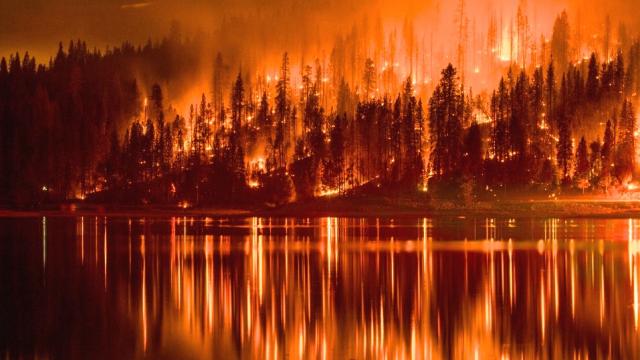
Is the climate movement at a political tipping point? Could right now, 2015, be that moment in history, be something akin to the 1964-1965 period for the civil rights movement? Those were the years that two major pieces of legislation, the Civil Rights Act and the Voting Rights Act, ended legal segregation in the South and opened the way for a whole series of positive social, cultural and political changes in the U.S. in the years since.
If looked at in that light, the answer is almost certainly “no.” Given the dominance of the Senate and the House by climate denier Republicans, it is extremely unrealistic to expect major national climate legislation until 2017 at the earliest.
However, there are other things at work, three in particular:
The growing strength of the grassroots-based climate movement, as seen last year in the People’s Climate March, banning of fracking in New York, staying power of the no Keystone XL pipeline message and Northwest no coal exports campaigns, deepening of the fossil fuel divestment movement, emergence of a growing movement against new gas pipelines, compressor stations and export terminals, most visible at the week-long early November nonviolent blockade in Washington, DC at the headquarters of FERC, and more.
The roughly 50 percent drop in the price of oil on world markets, which negatively affects both oil and gas production and profits and, therefore, the willingness of banks and money people to invest in the oil and gas industry; the serious overproduction/debt/lack of needed infrastructure/decline in supply/decline in prices worldwide crises for the shale gas (fracking) drilling companies; and the deepening difficulties of the coal industry caused mainly by competition from renewables and gas, low prices, and tightening federal regulations directed primarily at them.
The dramatic rise in renewables, particularly wind and solar, both in the U.S. and worldwide. Deborah Rogers Lawrence, writing on Jan. 3 on the EnergyPolicyForum website, quotes from a recent report issued by Bloomberg New Energy Finance: “By 2030, the world’s power mix will have transformed: from today’s system with two-thirds fossil fuels to one with over half from zero-emission energy sources. Renewables will command over 60% of the 5,579GW of new capacity and 65% of the $7.7 trillion of power investment.’ And that is without much shift in current policy to incentivize renewable production. If countries were to get serious about climate change, these figures could presumably be accelerated.”
In addition, 2015 is the year that the Pope is going to put forward a major encyclical and convene a meeting of religious leaders with the immediate objective of bringing pressure to bear on the December United Nations Climate Conference in Paris. That conference is on track to come up with some kind of a climate agreement, the big question being whether it’s more-of-the-same that we’ve seen for years and years or a badly-needed change of direction. Without question, the already-happening focus on this conference by the broad mix of people worldwide supporting strong action on climate, including the Pope, will undoubtedly have a big political impact, maybe even with the world’s governments.
What about that climate-denier-run Congress? Will they be able to fundamentally alter these powerful economic and political developments? Without question, they will try. Indeed, they already are with their effort to ram through the Keystone XL tar sands pipeline despite Obama’s announcement that he will veto that legislation. They intend to try to reduce the Environmental Protection Agency budget to hamstring its already-far-from-consistent efforts to do its job and, in particular, to try to slow or stop its plans to enact regulations for the electrical power generation industry. I wouldn’t be surprised if they tried very hard to come up with a package of financial gifts to our “poor and struggling” oil, gas and coal companies in their time of need.
Without question, the climate movement will need to rise to the challenge of these regressive efforts, as it is already doing on the Keystone XL front. But we need to be doing much more than this. We have some wind at our back, and we need to escalate our tactics.
It would be a very big mistake for the grassroots-based climate movement to get too caught up in the ins-and-outs of Capitol Hill battles. Indeed, the biggest contribution we can make to those defensive tactics is to do build up the political will of the American people for action on climate.
How can we best do this? In my view, learning from the civil rights movement and many other successful social movements down through history, we can best do so by escalating strategic, well-thought-through, nonviolent direct action and other visible, demonstrative actions in the streets, as massive and coordinated as we can make them.
2015 might be a turning point year, but it definitely won’t be if we don’t rise to the occasion. History and our grandchildren are calling on us to do so right now.
*
MEANWHILE, Joby Warrick and Chris Mooney reported for The Washington Post that 2014 is now officially the hottest year on record:
Planet Earth set an ominous record last year as global temperatures rose to the highest level since modern measurements began, scientists said Friday in a report that heightened concerns about humanity’s growing toll on the natural systems that sustain life.
The year 2014 was declared the hottest year in a joint announcement by NASA and the National Oceanic and Atmospheric Administration, based on separate analyses of weather records dating back to 1880, when Rutherford B. Hayes occupied the White House.
Driven in part by steadily warming oceans, average temperatures edged past the previous records set in 2005 and 2010. The 10 hottest years in modern times have all come since 1997, NASA scientists said.
“This is the latest in a series of warm years, in a series of warm decades,” said Gavin Schmidt, director of NASA’s Goddard Institute for Space Studies in New York City. While fluctuations are possible in any given year in a system as chaotic as weather, Schmidt said, “the long-term trends are attributable to drivers of climate change that right now are dominated by human emissions of greenhouse gases.”
The grim milestone was recorded in a year in which large portions of the American West baked under epic droughts and heat waves, and glaciers and Arctic ice sheets continued a decades-long retreat. Historic droughts threatened drinking-water supplies across large swaths of Brazil and Australia, and thawing Arctic tundra opened up vast sinkholes in parts of Siberia and northern Canada.
In one of the rare exceptions to the warming trend, 2014 was cooler than average in the eastern United States, as an unusual dip in the Jet Stream sent waves of Arctic air plunging southward. Eastern U.S. states were among the coolest areas of the world, compared with seasonal temperature norms.
But while Americans were shivering, the rest of the world experienced record warmth in seven of 12 months in 2014 — including December — a NOAA analysis found.
Most surprising about the new record was the fact that it appeared in a year that did not witness an El Niño, the warm-weather pattern associated with unusually high ocean temperatures in the east-central Pacific, NOAA and NASA scientists said.
“This is the first year since 1997 that the record warmest year was not an El Niño year at the beginning of the year, because the last three have been,” Schmidt said.
The data reviewed by the U.S. agencies confirmed that much of 2014’s warming was driven by the oceans, the planet’s great repository of heat. Ocean temperatures were more than 1 degree above average, reaching the highest levels ever recorded, NOAA said. Land temperatures weren’t quite record-setting, but still ranked fourth-warmest since the start of the data set in 1880. California, much of Europe, including the United Kingdom, and parts of Australia all experienced their warmest years.
Climate scientists said the streak of hot years was further evidence of human-induced warming caused by the buildup of greenhouse gases in the atmosphere. While the Earth’s climate has warmed and cooled throughout history, the recent warming correlates with sharply rising levels of heat-trapping carbon dioxide in the atmosphere from the burning of fossil fuels, scientists say.
“The temperature record is yet another brick in the massive wall of evidence that the climate is warming due to human activity,” said Simon Donner, associate professor of climatology at the University of British Columbia. “Of the 20 warmest years in recorded history, 19 happened in the past two decades. Our entire idea of ‘normal’ is changing.”
The widely anticipated finding deflated — but did not fully dispel — a perception that the rate of warming has slowed since the 1990s. Several scientists noted that 2014 was not a blowout, statistically speaking. The year surpassed the next runners-up by only a few hundredths of a Celsius degree, averaged across the globe. Some also noted that rising temperatures have not kept pace with computer simulations that predicted even faster warming, given the 40-percent rise in carbon dioxide levels in the atmosphere since the start of the industrial revolution.
“With 2014 essentially tied with 2005 and 2010 for hottest year, this implies that there has been essentially no trend in warming over the past decade,” said Judith Curry, professor in the School of Earth and Atmospheric Sciences at the Georgia Institute of Technology. “This ‘almost’ record year does not help the growing discrepancy between the climate model projections and the surface temperature observations.”
But other scientists said the spate of record-setting years should put to rest the notion of a global-warming “pause.”
“Viewed in context, the record 2014 temperatures underscore the undeniable fact that we are witnessing, before our eyes, the effects of human-caused climate change,” said Michael Mann, a professor of meteorology at Penn State University. “It is exceptionally unlikely that we would be seeing a record year — during a record warm decade, during a multidecadal period of warmth that appears to be unrivaled over at least the past millennium — if it were not for the rising levels of planet-warming gases produced by fossil fuel burning.”
The joint announcement by NOAA and NASA followed a careful, collaborative effort in which experts closely compared analyses. Last year, NASA and NOAA also worked together on an analysis of 2013, which ranks within the top-10 hottest years on record.
The new findings are also consistent with an earlier, preliminary analysis by the Japan Meteorological Agency, which pronounced 2014 the hottest year in its records, which go back to 1891. Another analysis based on satellite temperature recordings of the lower atmosphere or “troposphere,” conducted at the University of Alabama in Huntsville, found that 2014 was only the third-warmest year for this part of the planet. Still another leading agency that keeps temperature records, Britain’s Hadley Center for Climate Prediction and Research, has not yet released its 2014 results.
However, the joint NASA and NOAA statement will likely carry considerable force in a year in which world leaders will gather in Paris to negotiate a new global agreement to ratchet down greenhouse gas emissions.
Secretary of State John F. Kerry seized on the report in calling for “ambitious, concrete action” to address the causing of climate change.
“This report is just another sound in a steady drumbeat that is growing increasingly more urgent,” Kerry said in a statement. “So the question isn’t the science. The question isn’t the warning signs. The question is when and how the world will respond.”
3 WAYS TO SHOW YOUR SUPPORT
- Log in to post comments














